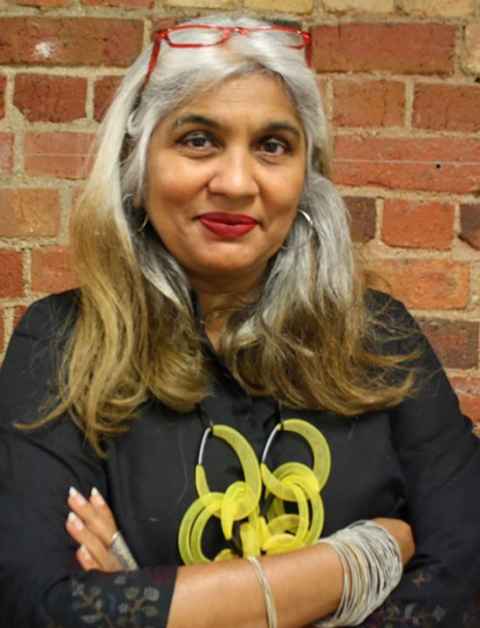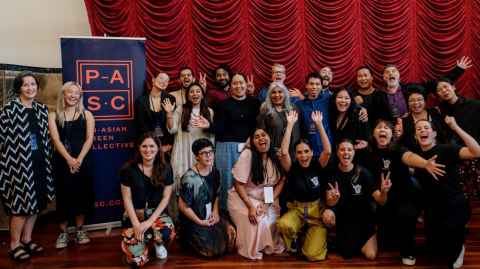Telling more Asian stories on screen
30 June 2023
More Asian screen practitioners are better equipped to tell their own stories, thanks to a ground-breaking programme run by the Pan Asian Screen Collective (PASC) and hosted by the University of Auckland.

A hapless bomb disposal officer and a dairy owner end up together in the bureaucratic afterlife; a kleptomaniac unwittingly steals a funeral urn from a suburban porch; teenage girls navigate racism and rivalries at a posh high school: these are just some of the ideas behind Episode One, five web series pilots made on a programme run by the Aotearoa-based Pan Asian Screen Collective (PASC).
Six teams of mainly pan-Asian creatives, including around nine University of Auckland staff and alumni, took part in the year-long, part-time programme to develop their series’ idea and produce a pilot, closely supported by a team of industry experts.
Initiated and designed by Associate Professor Shuchi Kothari, an experienced filmmaker who has been teaching screenwriting and producing in the University’s Faculty of Arts since 2001, the inaugural programme has been highly successful, not only in terms of offering invaluable learning opportunities, but also producing high quality work.
“It all started in 2018 when myself and Gilbert Wong, Roseanne Liang and Selina Joe [all UoA alumni] established PASC, a not-for-profit organisation, to advocate for equitable representation for New Zealand pan-Asians, on and behind the screen, and to break systemic barriers that often hold us back,” says Kothari.
Evidence published by New Zealand on Air revealed that Asians are the least-funded group, justifying a more targeted approach to bring about real change, she says.
“For the last five years, PASC has been constantly marrying two very important ideas: creating more opportunities for all Asians and providing skills, so that when a chance comes, you have a cohort ready to move forward.”

In 2021, Kothari approached the PASC board suggesting she design a programme to emulate the kind of pilot season they have in the US.
“You develop an idea, write the pitch deck [ standard presentation template] and screenplay and then shoot the pilot, so you learn through the whole process and also have something tangible to show for your vision.”
The idea, she says, was to build capacity among Asian screen practitioners.
“There's no way to learn except through doing, but there's also no better way to learn than with a lot of smart people helping you along; it’s a model we call ‘scaffolded development’.”
New Zealand on Air’s head of funding, Amie Mills, tapped into the Ministry of Culture and Heritage’s special Covid fund for development in the arts to fund the programme.
“I'd always designed this programme to include production,” says Kothari.
“Normally what happens for financial reasons is you have many creative labs around the world that bring you up to script level, and then you’re kind of left on your own. But if you really want to build capacity in a marginalised community, you have to see people through production.”

PASC was delighted to receive around $800,000 in total funding, which included $90,000 for each of the six pilot teams, whittled down from a shortlist of 13, which in turn were selected from many more.
Kothari approached Faculty of Arts Dean, Professor Robert Greenberg, to see if the course could be hosted by the faculty and received his immediate support.
The first four months was very heavily scaffolded, she says.
“We had lectures from international and national practitioners, people from Singapore, India, Korea, Australia, the UK and the US, as well as wonderful local industry experts. We had weekly lectures on Zoom because we couldn’t meet face to face. Each team also had individual mentors [sponsored by the New Zealand Film Commission] with whom writers, producers and directors could work.”
The programme also offered pitching sessions where teams had to pitch their idea to industry professionals and get feedback.
A private screening for family, friends, cast and crew and invited industry stakeholders, including broadcast commissioners, was held at the Hollywood Cinema in Avondale with Deputy Prime Minister Carmel Sepuloni in attendance.
“This wasn’t a public screening, as we wanted the pilots to remain fresh for a New Zealand audience, but we also wanted to acknowledge, celebrate and soft-launch the teams and their projects,” says Kothari.
And while she can’t reveal the fate of the five pilots, as it’s yet to be confirmed, she can say there is “good news” on the way.
“The course was hard work, they all did so well to complete it, and the goal was always to develop teams and build capacity, so this is just the cherry on the cake!”

Media contact
Julianne Evans | Media adviser
M: 027 562 5868
E: julianne.evans@auckland.ac.nz